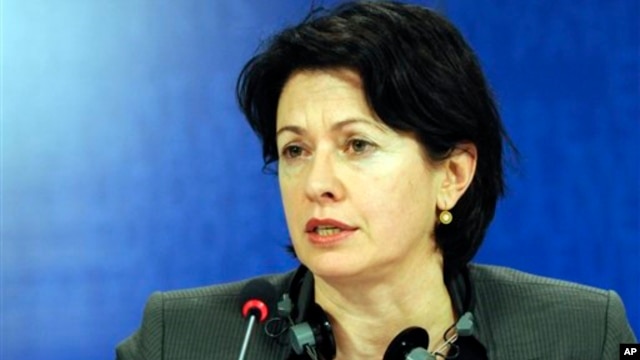Chair of the European Parliament Subcommittee for Human Rights, Barbara Lochbihler, talks to the media, February 2010.
July 17, 201
ADDIS ABABA — Members of a European Parliament human rights delegation have been blocked from visiting an Ethiopian prison, and are concerned about the human rights situation in that nation.
On Wednesday, the European Parliament Subcommittee for Human Rights wrapped up a visit to Ethiopia to assess the country's human rights situation. The delegation had a trip scheduled to the infamous Kality prison just outside the capital, Addis Ababa. The facility is known for housing political prisoners in harsh living conditions.
In spite of previous assurances from Ethiopia’s government, however, the group was denied access to the prison Wednesday morning, according to delegation member Jacek Protasiewicz.
“We were more than disappointed. Personally I cannot understand the reasons behind it," said Protasiewicz. "Because if you don’t want to show the parliamentarians how people are detained and the conditions in the prisons, it is clearly that something is to be hidden.”
The delegation also was scheduled to meet with a prominent imprisoned journalist, Reeyot Alemu, at the prison.
The members of the committee called upon the Ethiopian government to release journalists and opposition members, jailed under Ethiopia's anti-terrorism proclamation.
The European Union (EU) delegation said it believes the proclamation is used arbitrarily. The proclamation has also been criticized by organizations such as Amnesty International and Human Rights Watch.
A framework for non-governmental organizations (NGOs), implemented by the Ethiopian government, also is a point of concern for the EU subcommittee. The framework includes rules that say no more than 10 percent of an NGO's funding can come from foreign partners when the organization works in the field of human rights.
The chair of the EU delegation, Barbara Lochbihler, believes the framework makes it difficult for NGOs to work independently.
“We strongly encourage the government to give more space on the domestic levels for civil society organizations to operate independently and in a meaningful way. We think the restrictive NGO framework should be urgently revised,” said Lochbihler.
The conclusions of the visit will be presented to the European Parliament. If Ethiopia does not improve its human rights record, it might be complicate the country's trade with the European Union. The EU is considering linking trade policy agreements to other factors, such as human rights.
In spite of previous assurances from Ethiopia’s government, however, the group was denied access to the prison Wednesday morning, according to delegation member Jacek Protasiewicz.
“We were more than disappointed. Personally I cannot understand the reasons behind it," said Protasiewicz. "Because if you don’t want to show the parliamentarians how people are detained and the conditions in the prisons, it is clearly that something is to be hidden.”
The delegation also was scheduled to meet with a prominent imprisoned journalist, Reeyot Alemu, at the prison.
The members of the committee called upon the Ethiopian government to release journalists and opposition members, jailed under Ethiopia's anti-terrorism proclamation.
The European Union (EU) delegation said it believes the proclamation is used arbitrarily. The proclamation has also been criticized by organizations such as Amnesty International and Human Rights Watch.
A framework for non-governmental organizations (NGOs), implemented by the Ethiopian government, also is a point of concern for the EU subcommittee. The framework includes rules that say no more than 10 percent of an NGO's funding can come from foreign partners when the organization works in the field of human rights.
The chair of the EU delegation, Barbara Lochbihler, believes the framework makes it difficult for NGOs to work independently.
“We strongly encourage the government to give more space on the domestic levels for civil society organizations to operate independently and in a meaningful way. We think the restrictive NGO framework should be urgently revised,” said Lochbihler.
The conclusions of the visit will be presented to the European Parliament. If Ethiopia does not improve its human rights record, it might be complicate the country's trade with the European Union. The EU is considering linking trade policy agreements to other factors, such as human rights.



